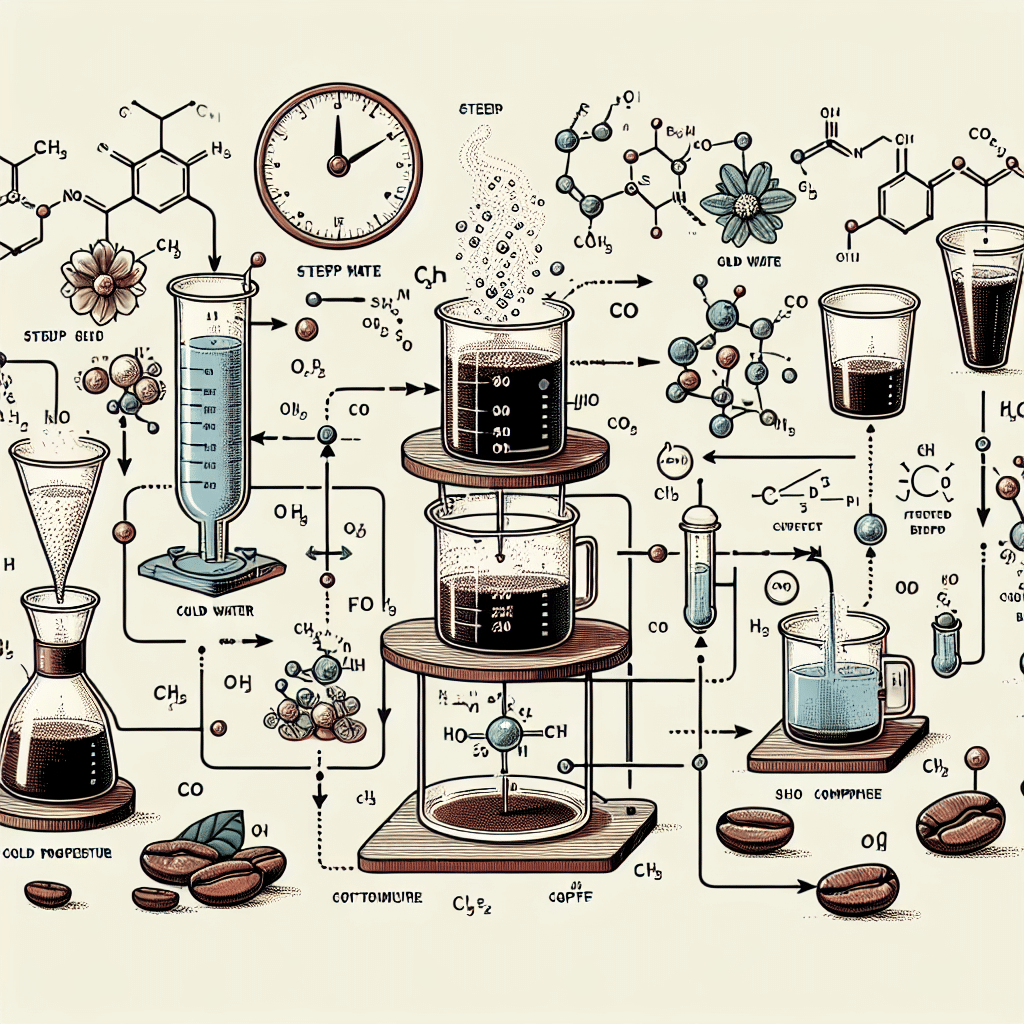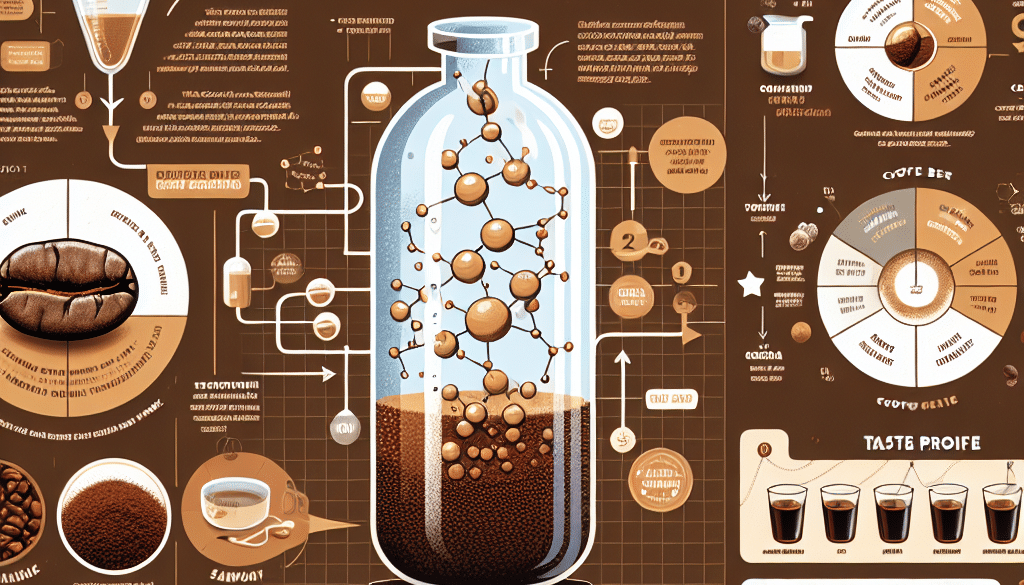What Science Tells Us About Making the Best Tasting Cold Brew Coffee
-
Table of Contents
- Unlocking the Secrets to the Perfect Cold Brew Coffee: A Scientific Approach
- The Science of Cold Brew Coffee
- Extraction: The Key to Flavor
- Chemical Differences in Cold Brew
- Choosing the Right Beans and Equipment
- Selecting Coffee Beans
- Essential Equipment for Cold Brewing
- Optimizing Your Brewing Process
- Grind Size and Consistency
- Water Quality and Temperature
- Steeping Time and Technique
- Flavor Enhancement and Preservation
- Dilution and Serving Suggestions
- Storage for Freshness
- Case Studies and Statistics
- Conclusion: Crafting the Ultimate Cold Brew
- Enhance Your Cold Brew Experience with ETprotein
Unlocking the Secrets to the Perfect Cold Brew Coffee: A Scientific Approach

Cold brew coffee has become a staple for coffee aficionados and casual drinkers alike, known for its smooth flavor and refreshing coolness. But what does science say about making the best-tasting cold brew? This article delves into the scientific principles behind cold brewing and offers insights into how you can craft the ultimate cold brew experience at home.
The Science of Cold Brew Coffee
Cold brew coffee is not just iced coffee; it’s a unique brewing method that relies on time and temperature to extract flavors from coffee beans. Unlike traditional hot brewing methods, cold brew uses cold water and an extended steeping period, which results in a different chemical profile for the final beverage.
Extraction: The Key to Flavor
The extraction process is central to the taste of your cold brew. It involves pulling flavors and compounds out of the coffee grounds. The rate of extraction is influenced by several factors:
- Grind Size: Coarse grounds are preferred for cold brew to prevent over-extraction and bitterness.
- Water Temperature: Cold water extracts flavors more slowly, leading to a smoother taste.
- Steeping Time: A longer steep allows for a full extraction, typically ranging from 12 to 24 hours.
- Coffee-to-Water Ratio: A higher ratio of coffee to water results in a stronger brew, which can be diluted to taste.
Chemical Differences in Cold Brew
Research shows that cold brew coffee has a different chemical composition than hot brew. It typically contains lower levels of acidic compounds, which can lead to a smoother, less bitter taste. Additionally, certain aromatic compounds are less volatile at lower temperatures, affecting the aroma and flavor profile of the coffee.
Choosing the Right Beans and Equipment
The type of coffee bean and the equipment you use can significantly impact the taste of your cold brew.
Selecting Coffee Beans
While personal preference plays a role, beans with a naturally sweet and fruity profile tend to work well for cold brew. Light to medium roasts are often recommended, as they retain more of the bean’s original characteristics.
Essential Equipment for Cold Brewing
There are several methods for making cold brew, but some key pieces of equipment include:
- A large jar or pitcher for steeping
- A fine-mesh sieve or cheesecloth for straining
- A coffee grinder for fresh grounds
Optimizing Your Brewing Process
Perfecting your cold brew involves fine-tuning the brewing process to suit your taste preferences.
Grind Size and Consistency
A consistent, coarse grind is crucial for even extraction and preventing a muddy final product. Investing in a quality burr grinder can make a significant difference.
Water Quality and Temperature
Using filtered water can improve the taste of your cold brew by removing impurities that might interfere with the coffee’s flavor. While room temperature is standard for steeping, some aficionados prefer to steep in the refrigerator, which can slow extraction even further and may result in a subtler flavor.
Steeping Time and Technique
The steeping time can vary based on the desired strength and flavor profile. Experimenting with different durations can help you find your ideal balance. Additionally, gentle agitation during the steeping process can encourage a more even extraction.
Flavor Enhancement and Preservation
Once you’ve brewed your cold brew, there are ways to enhance and preserve its flavor.
Dilution and Serving Suggestions
Cold brew concentrate should be diluted with water, milk, or a milk alternative to taste. Serving over ice can provide additional dilution as it melts, so consider this when determining your initial dilution ratio.
Storage for Freshness
Store your cold brew in an airtight container in the refrigerator to maintain freshness. It’s best consumed within a week to enjoy its optimal flavor.
Case Studies and Statistics
Several studies have analyzed the factors affecting cold brew taste. For example, a study by the University of Thomas Jefferson found that the type of roast can significantly affect the antioxidant levels in cold brew, with light roasts retaining more antioxidants than dark roasts. Another study published in “Scientific Reports” suggests that the cold brew method could result in a lower caffeine content compared to hot brewing methods.
Conclusion: Crafting the Ultimate Cold Brew
Making the best-tasting cold brew coffee is both an art and a science. By understanding the scientific principles behind extraction, choosing the right beans and equipment, and optimizing your brewing process, you can create a cold brew that’s tailored to your taste preferences. Remember to experiment with grind size, water quality, steeping time, and dilution to find your perfect cup.
Enhance Your Cold Brew Experience with ETprotein
For those looking to add a nutritional boost to their cold brew, ETprotein offers a range of high-quality protein products that can be seamlessly incorporated into your coffee routine. Their organic, non-GMO, allergen-free proteins are perfect for enriching your cold brew without altering its taste. Whether you’re looking to add a plant-based protein like pea or rice protein or explore the benefits of L-(+)-Ergothioneine, ETprotein has you covered.
About ETprotein:
ETprotein, a reputable protein and L-(+)-Ergothioneine (EGT) Chinese factory manufacturer and supplier, is renowned for producing, stocking, exporting, and delivering the highest quality organic bulk vegan proteins and L-(+)-Ergothioneine. They include Organic rice protein, clear rice protein, pea protein, clear pea protein, watermelon seed protein, pumpkin seed protein, sunflower seed protein, mung bean protein, peanut protein, and L-(+)-Ergothioneine EGT Pharmaceutical grade, L-(+)-Ergothioneine EGT food grade, L-(+)-Ergothioneine EGT cosmetic grade, L-(+)-Ergothioneine EGT reference grade and L-(+)-Ergothioneine EGT standard. Their offerings, characterized by a neutral taste, non-GMO, allergen-free attributes, with L-(+)-Ergothioneine purity over 98%, 99%, cater to a diverse range of industries. They serve nutraceutical, pharmaceutical, cosmeceutical, veterinary, as well as food and beverage finished product distributors, traders, and manufacturers across Europe, USA, Canada, Australia, Thailand, Japan, Korea, Brazil, and Chile, among others.
ETprotein specialization includes exporting and delivering tailor-made protein powder and finished nutritional supplements. Their extensive product range covers sectors like Food and Beverage, Sports Nutrition, Weight Management, Dietary Supplements, Health and Wellness Products, and Infant Formula, ensuring comprehensive solutions to meet all your protein needs.
As a trusted company by leading global food and beverage brands and Fortune 500 companies, ETprotein reinforces China’s reputation in the global arena. For more information or to sample their products, please contact them and email sales(at)ETprotein.com today.














